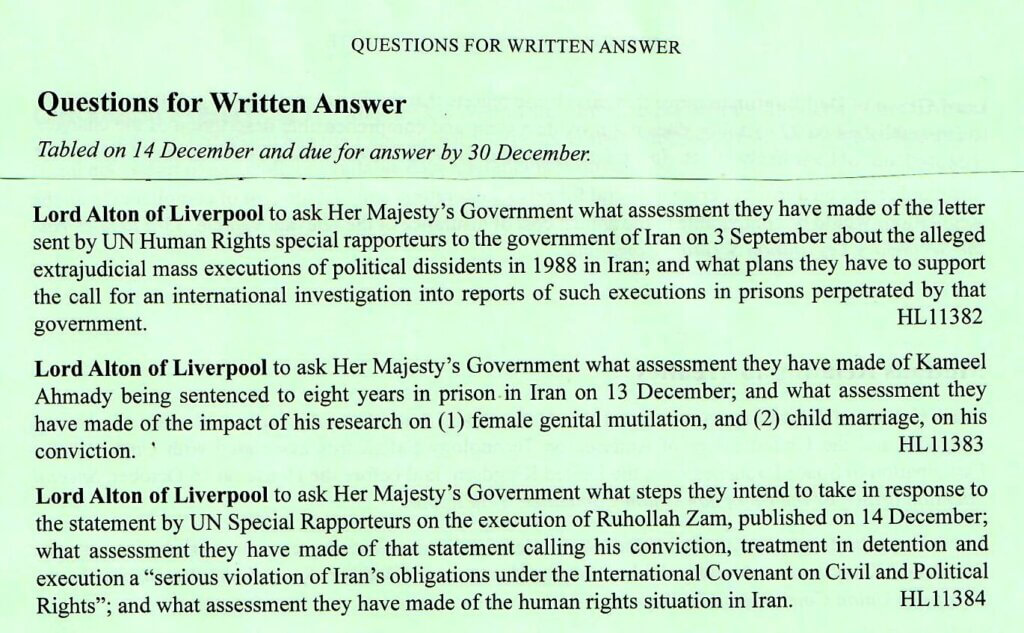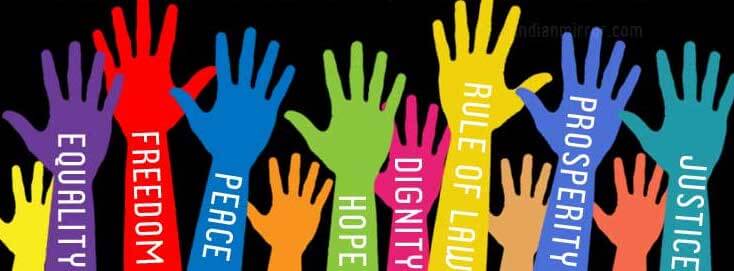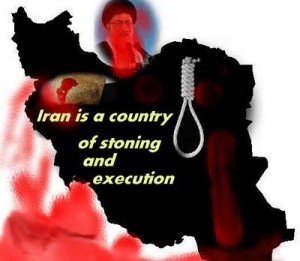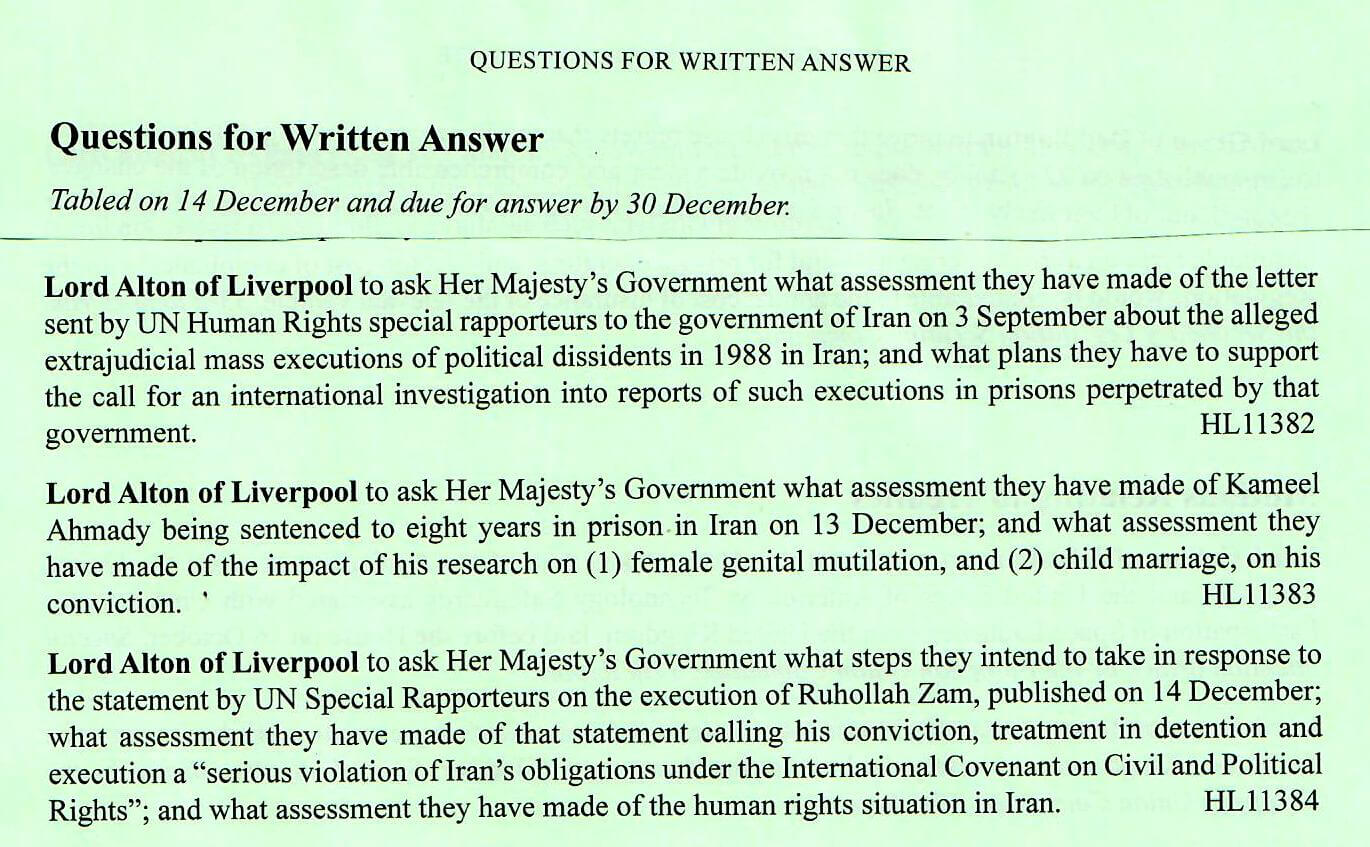
  |
| NEWS RELEASE [For immediate release: Tuesday 15 December 2020] |
| IBAHRI condemns the murder of Iranian dissident journalist Ruhollah Zam |
| The International Bar Association’s Human Rights Institute (IBAHRI) strongly condemns the execution of Ruhollah Zam, an Iranian dissident journalist and editor of the website and Telegram channel AmadNews. Mr Zam was arbitrarily arrested in October 2020 and sentenced to death for ‘spreading corruption on earth’. The sentence was confirmed on 8 December and he was hanged on 12 December 2020. There were 17 charges levied against Mr Zam, including ‘spreading propaganda against the Iranian regime’ and ‘cooperating with foreign intelligence services’ – he denied all charges against him. He was tried before Judge Abolqasem Salavati, a leading figure for repression of the media in the country, having sentenced over 100 journalists and workers in Branch 15 of the Tehran Revolutionary Court. The arrest and detention of Mr Zam were in clear breach of the Islamic Republic of Iran’s obligations under international law. Article 9(1) of the International Covenant on Civil and Political Rights (ICCPR), to which Iran is party, protects the right to freedom from arbitrary arrest and detention, as does Article 9 of the Universal Declaration of Human Rights (UDHR). Further, Mr Zam was denied his right to a fair trial and due process as guaranteed in Article 14(3)(g) of the ICCPR, which specifically provides that a defendant must not be ‘compelled to testify against himself or to confess guilt’. Iranian officials had broadcast footage showing Mr Zam blindfolded ‘confessing’ guilt before his trial. Under Article 38 of the Iranian Constitution, any kind of torture used to extract a confession or obtain information is forbidden and such evidence may not be used to obtain a conviction. The United Nations Human Rights Committee has held that violation of fair trial guarantees in proceedings that result in the imposition of the death penalty renders the sentence arbitrary in nature, and therefore in violation of Article 6 of the ICCPR – the right to life.  IBAHRI Co-Chair and immediate past Secretary-General of the Swedish Bar Association, Anne Ramberg Dr jur hc, commented: ‘The execution of Ruhollah Zam is a travesty of justice. Iran’s authorities have sought to legitimise the killing of a journalist who did not agree with their policies with arbitrary arrest followed by a sham trial. At every turn, his rights have been violated. Undoubtedly, the killing of Mr Zam is designed to dissuade independent media from reporting on issues that the Iranian authorities do not want exposed. This applies to journalists both within, and chillingly, self-imposed exiles fearful of their personal safety, beyond Iran’s borders. Truth-telling is a hazardous occupation in Iran.’ Referring to The High Level Panel of Legal Experts on Media Freedom, to which the IBAHRI serves as Secretariat,Ms Ramberg added: ‘The recommendations made in the advisory reports by The High Level Panel, provide advice on how to reverse abuses of media freedom and ensure the safety of journalists. Governments who say that they wish to respect and defend media freedom should also speak out in favour of abolition of the death penalty, as well as take on the other recommendations being made in the reports to ensure that history does not repeat itself.’ In October 2019, Iran’s Revolutionary Guards Corps said it had closed in on Mr Zam in a ‘complex operation using intelligence deception’. Mr Zam, who had been living in exile in France, was accused of using a Telegram channel to spread ‘fake news’ – in the form of videos, inciting the 2017-18 nationwide protests, as well as disseminating information on alleged corruption among Iranian officials. The channel had 1.4 million followers. In June 2020, Branch 15 of the Tehran Revolutionary Court convicted Mr Zam of, inter alia, ‘spreading corruption on earth’ and sentenced him to death. The ambiguous crime of ‘corruption on earth’ or ‘Efsad-e-fel-arz’ in Iran, carries the mandatory death penalty – capital punishment that is required by law, whether or not a sentencing judge thinks it fair. This is illegal under international human rights law – to prevent cruel, inhumane or degrading punishment, and the arbitrary deprivation of life. IBAHRI Co-Chair and former Justice of the High Court of Australia (1996 – 2006), the Hon Michael Kirby AC CMG, stated: ‘It is an outrage that journalist, Ruhollah Zam has paid the ultimate price of having his life prematurely ended simply for doing his job and exercising his right to freedom of expression and opinion. The IBAHRI Council Resolution on the Abolition of the Death Penalty (2008) vehemently denounces such punishment as a grave infringement of the universally guaranteed right to life. The global community has a duty to highlight the failures in this case, including the non observance of international standards, norms of fair trial rights and due process, basic human rights and fundamental freedoms that Mr Zam should have been granted’. Mr Kirby continued, ‘The death penalty should be abolished everywhere, but using it in Iran for crimes that are not defined as ‘the most serious’ or vaguely worded, including the crime of ‘corruption on earth’ or ‘Efsad-e-fel-arz’ is completely unacceptable. Iran should ratify the Second Optional Protocol to the ICCPR, aimed at the abolition of the death penalty, in accordance with the UN Secretary-General’s suggestion that “[t]he death penalty has no place in the 21st century.” One day we can be sure that Iran and its people will recognise this truth. Ruhollah Zam will then be honoured as a hero of truth.’ In the 14 July, issue eight of the Freedom of Expression Bulletin , the IBAHRI expressed concern that the sentencing was a move by the Iranian authorities to undermine free speech and the independence of the media, as well as to place undue pressure and influence on journalists and at the time called for the sentence to be overturned. ENDS |
| Notes to the Editor Related material: www.ibanet.org/Human_Rights_Institute/Work_by_regions/Middle_East/Iran.aspx The International Bar Association’s Human Rights Institute (IBAHRI), an autonomous and financially independent entity, works to promote, protect and enforce human rights under a just rule of law, and to preserve the independence of the judiciary and the legal profession worldwide. The International Bar Association (IBA), the global voice of the legal profession, is the foremost organisation for international legal practitioners, bar associations and law societies. Established in 1947, shortly after the creation of the United Nations , it was born out of the conviction that an organisation made up of the world’s bar associations could contribute to global stability and peace through the administration of justice. Find the IBAHRI on social media here: twitter.com/IBAHRI www.facebook.com/IBAhumanrights |




